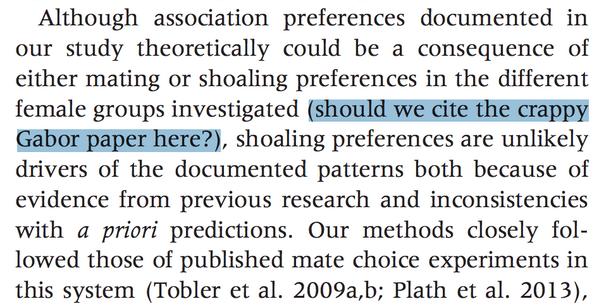Clearly anyone who reads PNAS and the woo about female hurricane names (among many other papers) and read my article in the Wall Street Journal indicting their process of letting pre-arranged friends of study authors hand-walk articles past peer review (the publicity from which led to them changing that policy) knows that subscription journals have their own problems.
Some of them are not peer reviewing at all. Or even editing. Or even proofreading. This paper on shoaling preferences in Ethology has been taken down because it has 2,000 retweets - and not in a good way - courtesy of UC Davis grad student David Jay Harris:

Which crappy paper? This one? Caitlin Gabor, 'Association patterns of sailfin mollies (Poecilia latipinna): alternative hypotheses', Behavioral Ecology and Sociobiology, October 1999, Volume 46, Issue 5, pp 333-340 DOI: 10.1007/s002650050627.
If so, Caitlin is not going to be pleased - and someone in the humanities or anthropology will start screaming sexism.
Does this happen a lot? It's hard to say. Mark Bairden replied:
@davidjayharris @sarahkendzior Paragraph three on the sixth page of a technical document, I wrote. "Are you still reading this?" No replies.
— Mark Mola (@markbairden) November 10, 2014Still, nothing compares to the classic "insert statistical method here" comment (which was open access) that got left in a paper, as noted by Neil Saunders. It's still there right now.





Comments